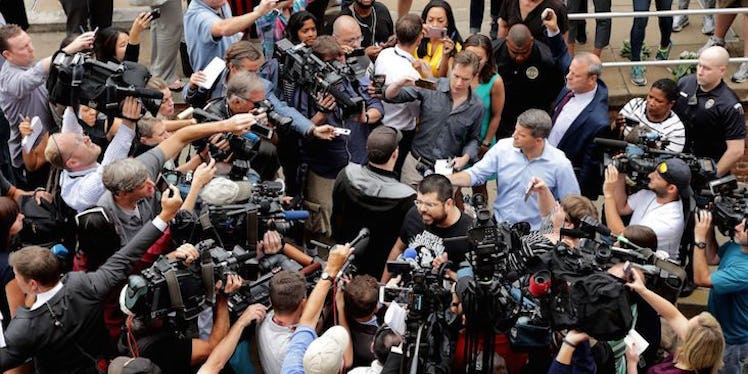
How Is A Hate Crime Different Than "Domestic Terrorism"? Charlottesville Attack Might Be Both
The words "terrorism" and "hate crimes" have been tossed around a lot this weekend, following the protest, counter-protest, and vicious attack in Charlottesville, Virginia, so it's worth breaking down exactly what they mean. Their legal definitions also matter, and differ from each other, according to the New York Times. Here's how hate crimes are different from domestic terrorism.
On Saturday, Aug. 12, a counter-protester named Heather Heyer died and more than a dozen more were injured when James Alex Fields Jr. allegedly drove his car into a crowd of counter-protesters at a white nationalist rally in Charlottesville, Virginia. Fields was charged with second-degree murder, among other counts. On Monday, Aug. 14, Attorney General Jeff Sessions said the incident met the domestic terrorism definition.
But here's where things get tricky: even if a large number of people died, and the intent was clearly meant to cause harm, it might not necessarily constitute "terrorism" in the traditional way we think of the word. In order to meet the legal definition of terrorism, a few things need to have happened.
Domestic terrorism must involve harm to human life that violates any national or state law (like murder).
It also must appear to be intended to: intimidate a civilian population; influence the policy of a government; or affect the conduct of a government by mass destruction, assassination, or kidnapping.
Writing for CNN, criminal defense lawyer Page Pate points out — in an opinion piece — that terrorism doesn't have as much to do with the number of casualties, or with the profile of the person who committed the crime (including their race, beliefs, etc.). The definition can be kind of vague, and doesn't define, for example, what a "civilian population" is.
What the person appeared to be intending to do matters more in labeling something as "terrorism."
At the time of writing in 2015, Page wrote that the San Bernadino shooting was not a clear, cut-and-dry case of terrorism, though numerous officials and media reports, like this one in the Washington Post a year later, named it as such.
With the abundant video evidence of the attack, it certainly gives the Department of Justice (DOJ) investigation a lot to go on.
And on Monday, appearing on ABC's Good Morning America on Monday, Attorney General Jeff Sessions conceded that the Charlottesville attack:
... does meet the definition of domestic terrorism in our statute.
Sessions added that the DOJ will be factoring in terrorism as they move forward with their investigation. According to the American Civil Liberties Union (ACLU), domestic terrorism is not a charge in itself — however, investigating it as such could open other doors for the Justice Department.
It's also possible the Charlottesville attack could also be deemed a "hate crime."
When we think of hate crimes, as the name suggest, we often think of any serious crimes, like murder, motivated by hatred in the form of, say, racism or sexism. Hate crimes, as codified by the Shepard Byrd Act of 2009, are those that:
... willfully cause bodily injury, or attempt to do so using a dangerous weapon, because of the victim's actual or perceived race, color, religion, or national origin.
But not all hate-motivated crimes are hate crimes.
Hate crimes are federal crimes, and could be pursued by federal prosecutors. However, as the Times points out, it might be hard to use this statute in this case, being that both the victim and attacker were white. On ideological grounds, this would be difficult as well, as hatred for political affiliation is not specifically mentioned in the law.
There's a chance a hate crime could be shown under another statute, part of Title 18. Section 245 states that it is a crime to:
... use, or threaten to use force to willfully interfere with any person because of race, color, religion, or national origin and because the person is participating in a federally protected activity[.]
As for a "federally protected activity," the right to peaceful assembly (shout-out to the First Amendment) could be applied, but the Times reports it's not clear whether protesting a white nationalist rally counts.
Some are arguing that the Justice Department could move forward with investigating both a hate crime and domestic terrorism.
But at this point, it's unclear what the federal investigation will yield.
Many are calling out bias in how the incident is being labeled.
Though legal definitions might help prosecutors parse through an investigation, these terms have their own bearing and meaning in everyday life. How we choose to define them as a society matters, too.
People are criticizing President Donald Trump for refusing to outright condemn white supremacy or label it as terrorism, when he readily called other incidents as such. Many on social media were quick to point out the lack of consistency in language:
Some called out Trump for being hypocritical, by criticizing former President Obama for not using the words "Islamic terrorism" in an incident last year. (Trump, for his part, finally did condemn the Charlottesville attack and denounced the "white supremacists" involved but many felt it was too little, too late.)
While it's unclear at this point what the events of the weekend will eventually be termed by officials, and what the investigation will show, many Americans may have already decided.